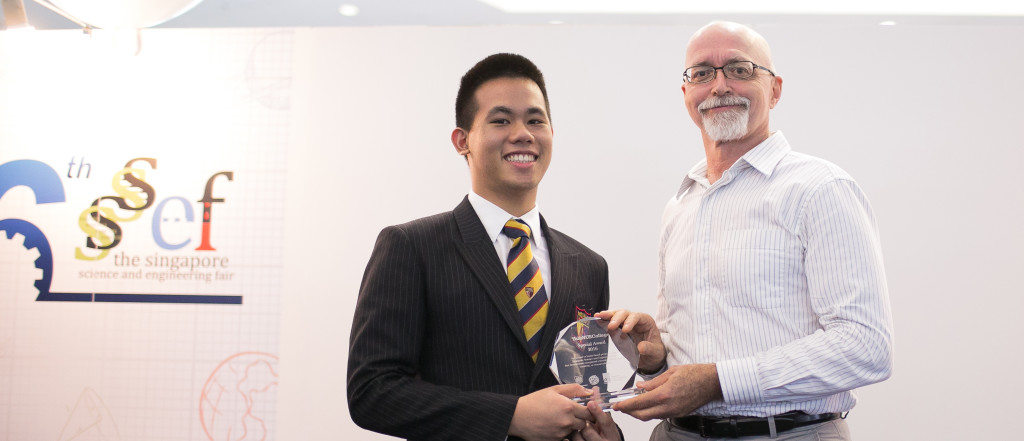Yale-NUS College presents Special Award at the Singapore Science and Engineering Fair 2016
At this year’s Singapore Science and Engineering Fair, students stood a chance to win a new award handed out by Yale-NUS College.
Titled the Yale-NUS College Special Award, the new accolade aims to recognise school or home-based science projects that demonstrated exceptional innovation, creativity and resourcefulness.
The Singapore Science and Engineering Fair is a national competition held annually at the Science Centre for secondary and pre-university students between 15 and 21 years of age. It is jointly organised by the Ministry of Education (MOE), the Agency for Science, Technology and Research (A*STAR) and the Science Centre Singapore (SCS).
Professor Neil Clarke, Associate Professor of Science at Yale-NUS College who proposed this initiative, revealed that the new accolade celebrates the achievements of students who were at a disadvantage, compared to those who “had access to functioning laboratories or high-end equipment”.

Professor Clarke (right) presenting the Special Award to a recipient.
Professor Clarke pointed out that the majority of science projects exhibited at the Fair were done at local universities or research institutes. Students who complete projects at research facilities were typically mentored by graduate students who would provide advice to help students improve their projects. Hence, these projects tend to win top accolades and the winners usually go on to compete at the Intel International Science and Engineering Fair, often hailed as the Olympics of science competitions. The Yale-NUS College Special Award aims to fill the gap and recognise students who worked on projects without access to such high-end resources.
Ten judges from the Yale-NUS Science Division judged the projects, including Professor Clarke, Assistant Professor Ng Hui Khoon and Assistant Professor Matthew Stamps.
After reading the written descriptions of 80 projects, the judges interviewed 20 groups of students at the Fair and finally selected 10 outstanding projects as recipients of the award. The students, who had all completed school or home-based science projects, were selected for their independence, creativity and resourcefulness.
One particularly interesting project looked at the effect of different disinfectants, for example chlorine, on human hair. The students involved in the project created a system that examined the hair before and after different treatments, and also had access to an instrument from the Science Centre that allowed them to analyse the hair surface.
Professor Clarke was impressed that the project formed from a scientific question that was based on what the students were already interested in.
“I liked that it was a science question that originated from the students,” he commented.
Andrew Lim, a junior college student studying at Anglo-Chinese School (Independent), was another recipient of the award. His project focused on strategies to solve Circular Minefield, an alternative version of the popular Minesweeper game where a player has to locate mines on a grid.
Andrew admitted that prior to winning the award, he was “quite surprised” as he thought that Yale-NUS was a small liberal arts college that did not have a Science faculty or offered any science curriculum.
Indeed, Professor Clarke acknowledged that the award also gives students an opportunity to learn more about the College.
“We wanted to bring to local students’ attention that a small liberal arts college is a good place to do science [and] saw this as an opportunity to get on the radar screen of students here,” he commented.
Science is one of the three divisions at the College, along with Social Sciences and Humanities, and is also a critical component of the Common Curriculum that all Yale-NUS students undergo. To support the Science programme here, the College is home to four science laboratories that are well-equipped for instruction in chemistry, biology and physics. Yale-NUS students can also share the research spaces and conduct scientific research at NUS. In addition, summer research programmes provide Yale-NUS students with opportunities for hands-on research in the sciences, social sciences and humanities during the mid-year break.
Ultimately, Professor Clarke hopes that the award will be able to highlight two things: that students do not need to do research in professional laboratories in order to succeed, and that they consider the College as an excellent option for their undergraduate studies. This special award will be given out annually at the Singapore Science and Engineering Fair, starting from this year.
For more information about the various science majors offered at Yale-NUS, click here.





